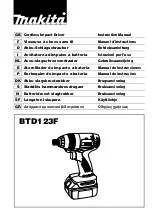
19
English
•
Material:
The type of material and surface finish of the material
will affect fastening torque.
•
Fastening Time:
Longer fasten ing time results in increased
fastening torque. Using a longer fastening time than recom-
mended could cause the fasteners to be overstressed, stripped
or damaged.
Capacity
Your 1/2" (13 mm) impact wrench uses sockets with 1/2" square drive
ends. A 3/4" (19 mm) impact wrench uses sockets with 3/4" square
drive ends. Both sizes of impact wrenches are capable of driving the
same range of hex impact sockets available.
In particularly heavy duty usage the 3/4" drive impact wrench has an
extra strong anvil that will resist breakage.
MAINTENANCE
WARNING: To reduce the risk of injury, turn unit off and
disconnect tool from power source before installing and
removing accessories, before making any adjustments or
removing/installing attachments or accessories.
An accidental
start-up can cause injury.
Your D
E
WALT power tool has been designed to operate over a
long period of time with a minimum of maintenance. Continuous
satisfactory operation depends upon proper tool care and regular
cleaning.
Lubrication
Your tool was properly lubricated before leaving the factory. In two to
six months, depending upon use, take or send the tool to a certified
service center for a thorough cleaning and inspection. This lubrication
should only be attempted by trained power tool repair persons, such
as those at D
E
WALT service centers or by other qualified service
personnel.
OPERATION
WARNING:
Always observe the safety instructions and applicable
regulations.
WARNING: To reduce the risk of injury, turn unit off and
disconnect tool from power source before installing and
removing accessories, before making any adjustments or
removing/installing attachments or accessories.
An accidental
start-up can cause injury.
Usage
Your impact tool generates the following output torque:
Cat #
Ft.-Lbs. (Nm)
DW292
345
(468)
DW293
345
(468)
DW294
345
(468)
CAUTION:
Ensure fastener and/or system will withstand the
level of torque generated by the tool. Excessive torque may cause
breakage and possible personal injury.
1. Place the socket on the fastener head. Keep the tool pointed
straight at the fastener.
2. Press rocker switch to start operation. Always check torque with
a torque wrench, as the fastening torque is affected by many
factors including the following:
•
Voltage:
Low voltage, due to generator or long extension cord,
will reduce fastening torque.
•
Socket size:
Failure to use the correct socket size will cause a
reduction in fastening torque.
•
Bolt Size:
Larger bolt diameters generally require higher
fastening torque. Fastening torque will also vary according to
length, grade, and torque coefficient.
•
Bolt:
Ensure that all threads are free of rust and other debris to
allow proper fastening torque




































